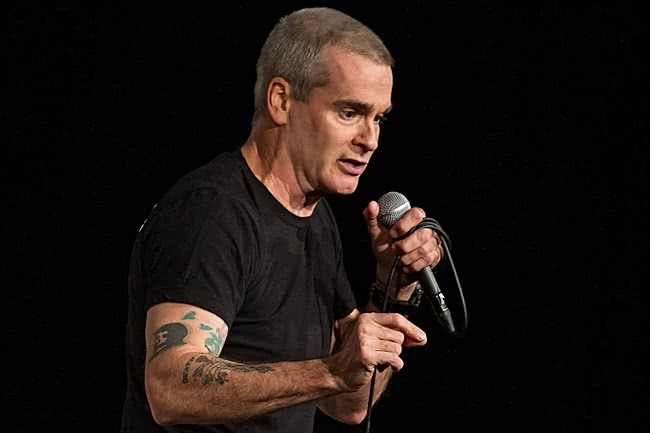The National Theatre is a great venue for anything that’s better seen sitting down. Apart from the smell of dust and aged fittings, the tiered seating that allows all punters to see the stage uninterrupted is a boon to performers and audiences alike. In the age of ‘cattle class’, this place is a real treasure. Promptly at eight, the performance began with a stand up comedy routine from Bruce Griffiths. An Aussie performer, he has supported Rollins on several of his Australian tours and, though his name doesn’t immediately spring to mind when mention of the Comedy Festival is made, managed to conjure lots of laughs with his quirky take on the everyday and his dead-pan delivery. Although his stage technique reminded us of other comedians, he was able to be fresh enough to be entertaining. Only one or two of his punch lines were obvious, and that’s great news for an audience well versed in the comedy genre.
For those who expected huge laughs from the Rollins show there was disappointment, and it seems that Henry has focussed more on the ‘spoken word’ in terms of storytelling and sharing his opinions rather than on funny situations for The Long March tour. For the punter who wanted to hear an intelligent rant with the occasional laugh, there was elation because Henry certainly delivered. Probably to describe Henry Rollins’ style to those who haven’t yet seen him, one would have to compare him to a steamroller on speed. Rollins is angry in a very fast and definite way. Diagnosed with hyperactivity at a young age, Rollins had to be slowed with Ritalin. He found an outlet for his energy, anger and intensity in the punk band Black Flag and later on in The Rollins Band after being inspired to perform by listening to The Ramones.
Certain elements of the punk music can be considered to be destructive and negative, and Rollins got himself into his fair share of trouble, though over the years he has managed to channel that anger into various causes. Rollins may have turned things around to the positive but the energy of his early days is still evident despite the fact that he is now on the wrong side of fifty. If you think The Long March is about entertainment, you are partially wrong. It is hard work to listen to Rollins. He does not polish over the hard issues and is confronting, opinionated and adamant. He also talks fast. In the two-and-a-half hour show he was not seen to draw breath and managed to cover a plethora or topics from equality of the sexes to troops in Afghanistan and from ‘gods, gays and guns’ in the U.S. to travel in North Korea.
It is refreshing to listen to straight-talking, especially when the rhetoric is researched well and based on something solid, and I’m sure for most Rollins fans (or maybe we should say ‘supporters’), it was good to get a dose of Rollins’ sense. He is well-read and has experience of many of the things he speaks of, so we know that he’s not just pulling these stories and thoughts out of his butt, but has been as close to living the situations as possible for a (once) working class, American male.
With a ‘routine’ that incorporates the issues of the day, Henry Rollins will never run out of material or causes…or of absurdities to be amused at. We cannot be certain of many things, but we can rely on death and taxes, and while Henry is amongst the living, we can certainly rely on him encouraging us and empowering people to be positive contributors to the world’s history, and of his return to ‘Oz’ for tour number thirty-one in the very near future.
– Sharon Brookes

































